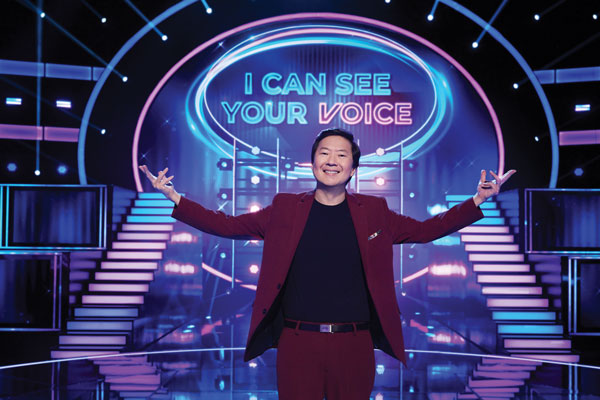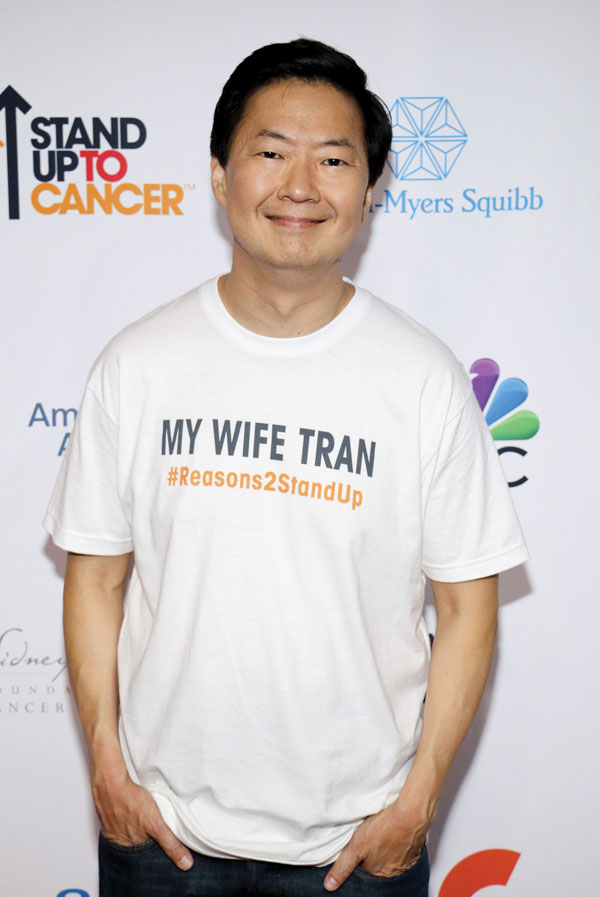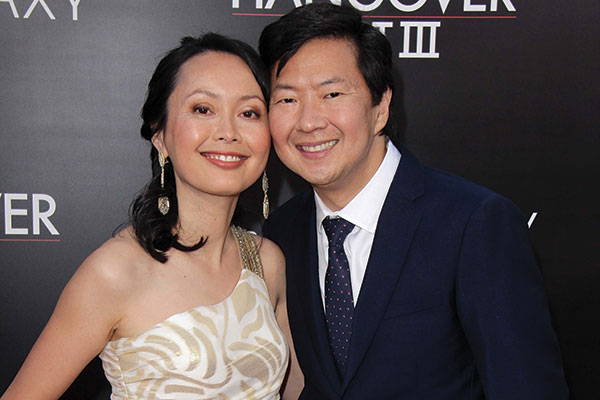Dr. Ken Jeong and Dr. Tran Ho
The Comedy Star and His Wife Get Candid about Her Breast Cancer and Finding Humor in a Dark Situation
by Ashley Hubbard
It all started with The Hangover movie in 2009. Well, to be clear, it started well before that. But it was this breakout performance that took Dr. Ken Jeong from doctor and sometimes actor to actor and sometimes doctor.

In addition to this small but memorable role, Dr. Ken has appeared in numerous television shows, including NBC’s Community and the eponymous Dr. Ken, as well as several movies, including 2019 Critics’ Choice Best Comedy Crazy Rich Asians and Warner Bros. animated films Scoob! and Tom and Jerry. He is also a stand-up comedian, TV personality, writer, and producer. Currently, you can catch Dr. Ken as a panelist on Fox’s reality competition series The Masked Singer and The Masked Dancer, and as the host and producer of I Can See Your Voice.
One word that can be used to describe Ken’s career trajectory is unusual. And through it all, there has been a single constant supporting him – his wife, Dr. Tran Ho. When Ken was still a practicing physician, he met Tran at a happy hour for doctors. After a brief engagement, the two were married in 2004.
Three years later, in 2007, the couple had their best year yet. Ken had stopped practicing medicine and begun acting full time, and Tran gave birth to twin daughters Zooey and Alexa. However, 2008 brought a big, but challenging, change. Tran was diagnosed with stage III triple-negative breast cancer and given a 23-percent chance of survival.
On the diagnosis and their reactions
“At about five months after [the twins] were born, I noticed I had developed a lump in my left breast,” Tran explains during a recent interview with Coping® magazine. “It was painful, and I thought, oh that happens all the time; it will get better.”
A physician herself, Tran wasn’t concerned. As she does with her own patients, she looked at the data. She was only 35, she had no family history of breast cancer, and it wasn’t entirely unusual to develop benign lumps, especially during breastfeeding.
However, about four months after initially feeling the lump, Tran decided to get it checked out just to make sure. A needle biopsy revealed what she anticipated all along – it was benign. Tran, along with her doctor, opted to just leave the lump alone as she was still breastfeeding her twins and wanted to continue doing that. By the time the twins were weaned, it was June, about nine months after Tran first noticed the lump.
“I called the surgeon,” Tran explains, “and I said, ‘I know it’s benign, but it’s more painful, and I think we should just remove the lump because, at this point, it’s symptomatic.’”
Not thinking anything of it, Tran went in for a routine lumpectomy, then went back to work and continued on with her life. However, the following day, she received the dreaded phone call.
“That was the last thing I thought she was going to say to me,” Tran says about receiving the diagnosis of triple-negative breast cancer. “I didn’t know what to think at that point.”
I did have my fears, but by the time morning came, I would rally myself and think, I’m going to do this. – Tran
Immediately, Ken was on his way over. “He was a real trooper,” Tran recalls. “He didn’t cry. He wasn’t upset. He was in doctor mode.”
But, later, Ken would admit to Tran that he was crying the entire drive over. “I was immediately in tears,” Ken tells Coping®. “I was trying to hide it from Tran. I remember […] just being in shock. All the emotions that are available, I felt.”

However, it didn’t take long for Ken to put on his doctor hat. “I knew from the first dose of chemo, there was a response, and a favorable one,” Ken reflects. “There was a long road ahead. It was like a marathon, but in that first mile, I sensed that there was hope and optimism. And, just based on the medicine, there was confidence.”
Four grueling phases of treatment
Tran’s treatment regimen began with two months of chemotherapy. After the first round, her oncologist felt optimistic since her tumor was responding well to the chemo. Following chemotherapy, Tran had a mastectomy, more chemotherapy, and then radiation. It all took seven long months.
Later, Tran underwent genetic testing, including checking for the BRCA gene mutation, all of which came back negative. “It’s just a reminder that, yes, cancer is unlikely in young women, it’s unlikely in people who don’t have the BRCA mutation, but it’s possible,” she says. “Always be aware. If you feel the lump, get it checked. And, honestly, sometimes doctors don’t always get it right. If the answer doesn’t make sense to you, it’s always good to be your own advocate.”
This experience of swapping roles, a doctor becoming the one being treated, has only humbled Tran. “I think it’s made me a better doctor, too,” she explains. “I tell [my patients], ‘You know yourselves the best, and I’m listening to what you have to say.’”
Even during cancer, life goes on
Just days after receiving her diagnosis, Tran had to take her medical board exam. These are extremely important and grueling tests that doctors take every ten years to retain their standing as a physician.
It’s our humor that gets us through life. It’s our humor that got us through Tran’s cancer.
It’s just trying to find light where there’s darkness. I think that, to me, is what humor is all about. – Ken
“It’s an eight-hour, multiple-choice exam,” Ken explains. To have the presence of mind to say ‘Well, the chemo is going to make me weak, so I might as well take the exam early…’ It’s just a testament to Tran’s character, being very Zen about it.
“She did it, and she passed with flying colors,” he adds. “I marvel at how she can keep as clear a head as she did. I mean, she’s my hero, and that exemplifies that.”
A mother’s love
While Ken was in awe of his wife’s ability to stay calm and cool, that doesn’t mean Tran’s breast cancer journey was easy. Being diagnosed with cancer at such an early age while caring for twin girls under the age of one would be challenging for anyone, even someone as “Zen” as Tran.
“It’s hard to be a young mother with breast cancer,” Tran admits. “Basically, everyone you see getting chemo is older, post-menopausal. Their kids are all grown up, they don’t have little kids at home, and that part was hard.” But, Tran says that she was never angry, never mad at the surgeon or the pathologist for the missed diagnosis, and she never felt that it was unfair. In fact, when she was diagnosed, Tran recalls feeling grateful.
“It seems crazy, but I felt thankful that I had such a wonderful life already,” Tran explains. “I was really happy that I had the girls, that I was married, that I had Ken. I felt like I had already lived such a great life and it was a miracle. I did feel like I was going to survive, but I also felt like it was OK.
“[The twins] kept my eyes on the prize. I thought, I’m going to live; I’m going to fight this. I’m going to live for the girls, for Ken. And, at night, I would lapse and think about statistics on young women and triple-negative breast cancer, and it’s not great. I did have my fears, but by the time morning came, I would rally myself and think, I’m going to do this.”
Finding humor in a dark situation
As Ken is a life-long comedian, it’s obvious humor is important to him. But upon asking Tran how important humor is in a relationship, she says, “Oh, yes, it’s a make it or break it thing.” Finding humor in a dark situation is a delicate act, and Ken explains how to hit that balance.
There’s nothing funny about it. The only thing you can do, much like this pandemic, is show compassion, show empathy, show love, and then, from that point of view, there may be an opportunity for humor. – Ken
“I don’t think there’s any way to make any condition funny,” Ken explains. “There’s nothing funny about it. The only thing you can do, much like this pandemic, is show compassion, show empathy, show love, and then, from that point of view, there may be an opportunity for humor.
“In comedy, in general, you don’t look to find something that’s funny. You look to find something that’s a tension relief. And that may not be a joke; it may just be a moment. And I feel that “comedy” isn’t the right word. It’s more just trying to find light at the end of the tunnel. It’s our humor that gets us through life. It’s our humor that got us through Tran’s cancer. It’s just trying to find light where there’s darkness. I think that, to me, is what humor is all about.”
Looking back and moving forward
Looking back to when their relationship began nearly two decades ago, few people in their lives would have guessed that Ken and Tran would be where they are today, including themselves.
“My whole career has been very surreal,” Ken says. “I just remember that when I quit my day job, it was Tran who supported me. I don’t think I would have done it without her. She’s very Zen about life and goes with the flow – and I’ve learned that from her. After Tran’s breast cancer and subsequent treatments, that really resonated with me, that it’s important to take life day by day, just slow things down. Life is short, and we need to maximize the opportunities we have while we’re here.”
In their nearly 20 years together, Ken and Tran have experienced their share of challenges, but their life together has mostly been full of love, gratitude, and a whole lot of humor. “I’m just so grateful, above all else, that Tran is OK, Tran is healthy,” Ken says. “She’s been cancer-free for 12 years. And as time goes by, it’s good to remind ourselves to be grateful.”
You can keep up with Dr. Ken Jeong at KenJeong.com, or follow him on Instagram and Twitter, @KenJeong.
This article was published in Coping® with Cancer magazine, January/February 2021.
Cover photo by Trae Patton© 2016, NBCUniversal/Getty Images


